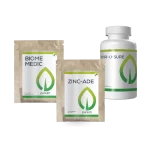A nutrient deficiency is when your body does not receive or absorb enough of a specific nutrient. This can be caused by inadequate dietary intake, malabsorption issues, a medical condition, or surgery. Nutrient deficiencies are common in children for a number of reasons. They may be picky eaters, have malabsorption issues, a medical condition, food allergy, or a genetic disorder. It can be hard to make sure your little one is getting all the vitamins and nutrients they need on a daily basis.
Nutrient deficiencies can impact your child’s overall health. It can also delay their growth, or development. Some nutrient deficiencies may hinder your child being able to sit, crawl, or walk. They can cause poor bone development. Delayed height and weight gain. Hinder cognitive abilities, learning capacity, and overall brain development. Nutrient deficiencies can cause low energies, poor immune function, increased risk of tooth decay, weakened tooth enamel, constipation, diarrhea, dry skin, flaky skin, brittle hair, weak nails, frequent overnight awakenings, or early morning rising.
Common Deficiencies In Children
There are some nutrient deficiencies that are common amongst children. They are iron, vitamin D, zinc, calcium, vitamin B12, potassium, and fiber.
Iron
Iron is the most common nutrient deficiency in children. Iron helps support your body’s growth and development. Symptoms of an iron deficiency are pale skin, fatigue, cold hands and feet, poor appetite, delayed growth and development. Iron rich foods for your child are red meat, poultry, salmon, tuna, sardines, eggs, beans, lentils, peanuts, almonds, raisins, dried apricots, brown rice, oatmeal, spinach, and kale. There are also iron-fortified cereals that can be a good option of iron for your kids. Fortified foods are a food that has an essential nutrient added to it. This can improve the nutritional value of the food and help with nutrient deficiencies. For best iron absorption mix an iron rich food with a vitamin C rich food.
Vitamin D
Vitamin D deficiency is another common one. Especially for children who live somewhere, where winter is a big part of the year for them. Less sun exposure usually can lead to a vitamin D deficiency. Vitamin D is important for calcium absorption and strong bones. Symptoms of a deficiency are fatigue, muscle weakness, irritability, developmental delays, and a condition called Rickets which causes thin, weak, and deformed bones. Getting direct sun is a great source of vitamin D. You can allow your child a few minutes of direct sun, then give them a sunscreen option to prevent sun burns from the UV rays. Foods that are high in vitamin D are fatty fish, eggs, fortified milk, yogurts, and cereals.
Calcium
Calcium is imperative for bone strength. Symptoms of a calcium deficiency are irritability, lethargy, muscle twitches, dry skin, dry nails, brittle hair, and seizures. Dairy products are the best source of calcium, there are also calcium-fortified foods, and dark leafy greens provide calcium.
Zinc
Zinc is needed for optimal growth, strong immunity, sex hormone development, cognitive functioning, and healthy digestion. You only need a small amount of zinc, but it is an important nutrient. Symptoms include loss of appetite, delayed growth, impaired immune function, and irritability. Foods that are high in zinc are meat, shellfish, legumes, nuts, seeds, eggs, and whole grains.
Vitamin B12
Vitamin B12 deficiency is common in children who breastfeed with a mother who has a vitamin B12 deficiency. Vitamin B12 is important for healthy red blood cells, cognitive development, enhanced immunity, and converting food to energy. Meat, dairy and eggs are all good sources of vitamin B12. Symptoms of a deficiency include fatigue, loss of appetite, diarrhea or constipation.
Potassium
Potassium helps your body build muscle, grow, function nerve cells, and regulates the body acid and water in the body. Symptoms of a deficiency include fatigue, muscle weakness, muscle twitches, constipation, lightheadedness, excessive urination, and excessive thirst. Good sources of potassium include bananas, avocados, sweet potatoes, spinach, oranges, beets, and dried apricots.
Fiber
Fiber helps prevent constipation, improve heart health, and enhance good gut bacteria. Symptoms of fiber deficiency is constipation, or straining while having a bowel movement. Good sources of fiber are pears, apples, raspberry, green peas, wheat bread, quinoa, oatmeal, beans, and lentils.
Eating a healthy diet and a well rounded diet is the best option for your child. This way they are for certain to get all the vitamins and nutrients they need to be the healthiest they can. Teaching them to eat a well rounded diet will help them in later years when they are in charge of their own meals and what to eat. Letting some of these deficiencies continue without addressing them can lead to harm as your child grows and develops. It can be hard to have your child try new foods especially if they are picky eaters. Get creative in the kitchen. There are tons of hidden veggie recipes out there that you may be able to try and entice your little one with to help make sure they are getting a well rounded diet. If you are concerned about a deficiency in your child, make sure you speak with their pediatrician to make sure supplements are not needed to correct a severe deficiency.
Sources:
https://wakeforestpediatrics.com/4-nutritional-deficiencies-in-children/
https://pmc.ncbi.nlm.nih.gov/articles/PMC4023304/
https://elsenutrition.com/a/resources/nutrition/nutrient-deficiencies-in-children?srsltid=AfmBOopNOSK0Bw4c_l02JGsKEFDUXxrbp0QaaUUvMVz0Dae4QgWjVYmA
https://nurturechildrenshealth.com/signs-of-nutritional-deficiencies-in-children/









